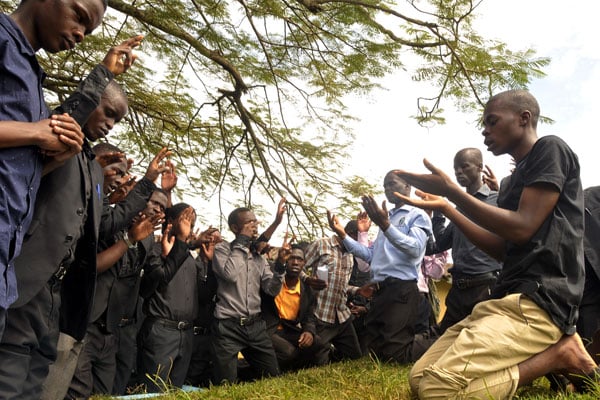Prime
Makerere to verify degrees of employed alumni afresh

Graduands of Bachelor of Laws during the 73rd graduation ceremony at Makerere University, Kampala on February 13. PHOTO/FRANK BAGUMA
What you need to know:
- Academic Registrar Mukadasi says verification of papers of each academic award will cost Shs50,000.
Makerere University has asked employers and higher academic institutions whose staff and students, respectively, graduated from Uganda’s oldest and largest public university, to submit their academic documents for reverification.
The planned authentication communicated in a November 9 public call, officials said, aims to protect the integrity of papers issued by the institution in the wake of rising technology-enabled forgeries.
Prof Buyinza Mukadasi, the university academic registrar, noted that they had been yanked to act following public concerns by Ombudsman Beti Kamya that fake graduates had found their way into lucrative jobs, including government hiring.

The Inspector General of Government (IGG), Ms Beti Kamya, addresses Parliament’s Adhoc Committee IN 2022. PHOTO/FILE
The Inspector General of Government (IGG) also questioned the competence of the job holders.
In his letter addressed to all employers and managers of higher education institutions worldwide, Prof Mukadasi cited concerns by Ms Kamya aired during NTV-Uganda news bulletin on “increasing levels of forgeries/falsification of the academic documents …”
“There are people out there who use modern technology to forge or falsify academic documents,” Prof Mukadasi noted.
He added: “Being aware of the damaging effects of this concern raised by the IGG, the Office of the Academic Registrar, Makerere University, hereby decided to make an open call to all employers and managers of higher education institutions, to verify with us the authenticity and validity of academic documents of persons who claim and hold qualifications awarded by Makerere University”.

Graduates celebrate during the Makerere University graduation ceremony at the institution premises on May 27, 2022. PHOTO/FILE/MICHAEL KAKUMIRIZI.
We were unable to establish the number of graduates of the university in employment, but insiders estimate them in several thousands for the 101-year-old institution.
Academic Registrar Mukadasi said verification of papers of each academic award will cost Shs50,000, suggesting the authentication exercise would open up a substantial new revenue stream for the university.
Makerere University asked employers “to undertake regular and periodic audit and quality checks of the qualifications and competence of persons who work/study” in different institutions.
In 2018, Makerere University set up a unit to verify academic documents following an increase in demand by employers to have academic credentials of their employees checked afresh.
Documents presented by 140 out of 600 employee examined were found made-up, leading to the National Social Security Fund(NSSF) firing 40 of them it had hired.
Other organisations that presented papers of their staff for checks included the Bank of Uganda (BoU) and Uganda Revenue Authority (URA).
Verification of authenticity of academic documents is very common when students are seeking scholarships abroad, but it is not a common practice for local employers to double check the same in the country, except on needs basis.
The Federation of Uganda Employers (FUE), a grouping that calls itself on the website as “leading organisation in serving employers’ interests and needs … to enhance employers’ competitiveness”, yesterday welcomed the move.
“It is a chance to any employer who may have had doubts with any issues with their respective employees to check. This is not something new because if as an employer I had doubts, I would have done the necessary due diligence including reaching out to the academic institution an employee claims to have attended,” said Mr Dan Okanya, FUE’s head of policy and research.
He said employees presenting fake academic documents is not an issue in the private sector because of what he termed as a “robust system of recruitment” that eliminates such characters before one is confirmed as an employee.
Workers representative and former State Minister for Sports, Mr Charles Bakkabulindi, in an interview counseled that employers should maintain the existing practice of reaching out to institutions of higher learning with queries of individual cases instead of general exercise which he says is not practical.
“It is a funny thing and I doubt if the employers will have the time do it. If the employer feels that they have queries, they can raise it with the university as is the practice, but I wouldn’t expect a universal exercise. I think it should be on an individual basis,” he said.
Uttering false documents, also known as forgery, as the IGG called it to spark Makerere’s move, is a criminal offence under Sections 342 & 349 of the Penal Code Act anyone convicted of the offence is subject to fines and imprisonment, or both.
The severity of the punishment, which includes creating, altering, or using false documents with the intent to deceive or defraud, depends on the nature of the forged document, the intent behind the forgery, and other surrounding circumstances.
Background
In 2018, Makerere University set up a unit to verify academic documents following an increase in demand by employers to have academic credentials of their employees checked afresh.
Documents presented by 140 out of 600 employee examined were found made-up, leading to the National Social Security Fund(NSSF) firing 40 of them it had hired.



